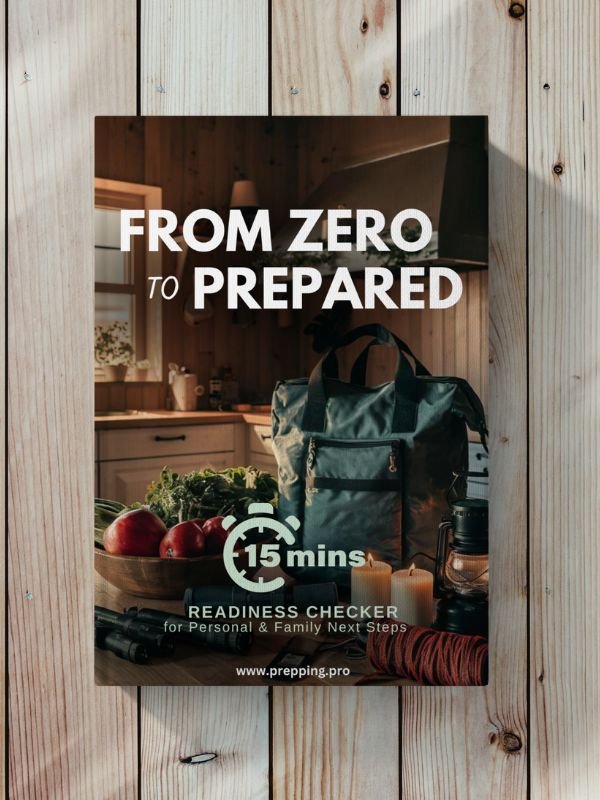As geopolitical tensions continue to rise, the specter of a potential World War 3 looms larger than ever before. While the prospect of global conflict is unsettling, it’s crucial to acknowledge the reality of the threats we face.
This article will provide a comprehensive guide to prepping for the worst-case scenario, ensuring you and your loved ones are prepared for the potential impacts of World War 3 on daily life.
Table of Contents
Understanding the Current Global Threats

Geopolitical Landscape
The global political landscape is becoming increasingly volatile, with tensions escalating in key regions around the world.
Here are some of the areas of concern:
| Region | Tensions |
|---|---|
| Middle East | Ongoing conflicts, proxy wars, and instability |
| Eastern Europe | Disputes over territory and political influence |
| East Asia | Territorial disputes and nuclear ambitions |
Leadership changes in major powers have also contributed to the uncertainty, as new administrations reshape foreign policies and alliances.
The Risks of Nuclear War
The threat of nuclear war remains a chilling possibility in the event of a global conflict. Here are some of the nations with nuclear capabilities and potential instability:
| Nation | Nuclear Arsenal |
|---|---|
| North Korea | Estimated 20-60 warheads |
| Pakistan | Estimated 165 warheads |
| Russia | Estimated 6,257 warheads |
While the probability of a full-scale nuclear exchange is low, the consequences would be catastrophic and long-lasting.
Impacts of World War 3 on Daily Life

Potential Disruptions
In the event of a global conflict, we can expect significant disruptions to critical infrastructure and services:
- Power grids: Potential damage or intentional attacks could lead to widespread power outages.
- Communication networks: Disruptions to internet, phone, and broadcast systems could hinder information flow.
- Transportation systems: Damage to roads, bridges, and transportation hubs could disrupt the movement of people and goods.
These disruptions could also strain public infrastructure and government stability, leading to breakdowns in essential services and social order.
Social Chaos
The impacts of World War 3 would extend far beyond infrastructure, affecting the very fabric of society:
- Daily routines: Work, school, and everyday activities could be severely disrupted or halted altogether.
- Social structures: Existing social norms, laws, and institutions may break down, leading to civil unrest and a breakdown of public order.
- Public resources: Medical facilities, emergency services, and food distribution systems could become overwhelmed or inoperable.
Preparing for potential social chaos is crucial to ensuring your safety and well-being during a global crisis.
Preparing for the Worst

Financial Preparation
Building a Financial Buffer
In the event of a global conflict, financial stability could be severely impacted:
- Savings and debt reduction: Building an emergency fund and reducing debt can help you weather potential economic storms.
- Income disruption: Prepare for the possibility of job loss or a significant reduction in income.
Actionable steps:
- Set financial goals: Determine how much savings you need for your emergency fund and create a plan to reach that goal.
- Reduce expenses: Identify areas where you can cut back on non-essential spending to free up funds for savings and debt repayment.
- Diversify income sources: Explore alternative income streams or acquire skills that could generate income during a crisis.
Self-Sufficiency
Developing self-sufficiency can help you become less reliant on external systems and resources:
- Income-generating skills: Learn practical skills like gardening, carpentry, or trades that could provide you with an income source.
- Financial independence: Explore ways to reduce your reliance on traditional employment, such as starting a home-based business or investing in passive income streams.
Actionable steps:
- Learn new skills: Take classes, attend workshops, or find online resources to develop income-generating skills.
- Start a side hustle: Use your skills to offer services or create products you can sell online or locally.
- Invest in passive income: Research and consider investments in rental properties, dividend-paying stocks, or other passive income sources.
Stockpiling Essentials
Food and Medicine
Having a well-stocked supply of essential items can ensure your survival during times of scarcity or disruption:
| Food and Medicine | Details |
|---|---|
| Non-perishable foods | Canned goods, dried foods, MREs |
| Water | Potable water and water purification systems |
| Over-the-counter medications | Pain relievers, antihistamines, first-aid supplies |
| Prescription medications | Stockpile essential prescriptions when possible |
Actionable steps:
- Create a food stockpile plan: Determine your family’s caloric needs and plan your food stockpile accordingly.
- Rotate your stockpile: Regularly consume and replace older items to maintain freshness.
- Learn food preservation techniques: Explore methods like canning, dehydrating, and root cellaring to extend the shelf life of perishable foods.
Non-Food Supplies
In addition to food and medicine, other essential non-food items should be stockpiled:
- Hygiene and sanitation supplies
- Fuel sources (propane, firewood, etc.)
- Backup power sources (generators, solar panels)
- Camping and outdoor gear
Actionable steps:
- Prioritize essential items: Make a list of non-food items essential for your family’s survival and prioritize stockpiling them.
- Proper storage: Ensure your stockpile is stored in a cool, dry, and secure location to maximize shelf life.
- Rotate and maintain: Regularly check and rotate your stockpile, replacing expired or damaged items.
Safety and Security
Home Defense and Security
Securing your home and developing a comprehensive defense plan is crucial in times of social unrest:
- Home fortification: Reinforce doors, windows, and entry points to deter potential intruders.
- Alarm systems and surveillance: Install security systems and cameras to monitor your property.
- Defense strategies: Develop plans for defending your home and coordinating with neighbors or community groups.
Actionable steps:
- Assess vulnerabilities: Identify weak points in your home’s security and prioritize reinforcing them.
- Learn self-defense: Consider taking self-defense classes or learning non-lethal defense techniques.
- Develop communication plans: Establish communication protocols with family members and trusted neighbors in case of emergencies.
Health and Medical Preparation
Access to medical care may be limited or unavailable during a global crisis:
- First-aid and medical supplies: Stockpile over-the-counter medications, bandages, and other first-aid supplies.
- Emergency medical training: Learn basic first-aid and emergency medical procedures.
- Alternative medicine: Explore natural remedies and alternative medical practices that could be useful in a crisis.
Actionable steps:
- Take first-aid courses: Enroll in first-aid and emergency medical training courses.
- Build a comprehensive medical kit: Consult with medical professionals to determine the essential supplies for your kit.
- Learn about natural remedies: Research and learn about the use of herbs, essential oils, and other natural remedies for common ailments.
Managing Quarantine and Isolation

Preparing for Quarantine
In the event of a global pandemic or widespread contamination, quarantine and isolation measures may be necessary:
- Long-term isolation plans: Develop strategies for extended periods of isolation, including entertainment, education, and exercise routines.
- Maintaining routines: Establish schedules and routines to maintain a sense of normalcy and stability during isolation.
Actionable steps:
- Create a quarantine plan: Determine the supplies, activities, and routines needed for your family to thrive during extended isolation.
- Stockpile entertainment: Build a stockpile of books, movies, games, and other entertainment sources.
- Stay active: Incorporate physical activity and exercise into your quarantine routine.
Sustaining Entertainment and Mental Health
Maintaining morale and mental well-being during a crisis is crucial for survival:
- Family activities: Plan and engage in family-friendly activities to foster connection and reduce stress.
- Hobbies and creative outlets: Pursue hobbies, crafts, or creative projects to stimulate the mind and provide an emotional outlet.
- Mental health resources: Explore online resources, support groups, or counseling services to help manage stress and anxiety.
Actionable steps:
- Create an activity schedule: Plan and schedule family activities, game nights, or movie marathons to look forward to.
- Explore new hobbies: Learn a new skill or craft.
Conclusion
As we navigate an increasingly uncertain world, the importance of being prepared for the unthinkable cannot be overstated.
While the prospect of a global conflict like World War 3 is daunting, taking proactive steps to ensure your family’s safety and well-being can provide a sense of resilience and control.
Preparation is not about living in fear; it’s about being proactive and taking responsibility for your own security.
By understanding the potential threats, stockpiling essential supplies, and developing contingency plans, you can face even the most dire circumstances with confidence and resolve.
Remember, prepping is an ongoing process, and it’s never too late to start.
Take the time to assess your current level of preparedness and identify areas where you can improve.
Engage with like-minded individuals in your community, share knowledge and resources, and work together to create a more resilient and self-sufficient support system.
In the face of uncertainty, the best defense is preparedness.
Embrace the mindset of a prepper, stay vigilant, and take action to safeguard your future.
The road ahead may be challenging, but with the right mindset and preparation, you can navigate even the most turbulent of times.
We encourage you to continue exploring this topic, seeking out reputable sources, and sharing your own experiences and insights with others.
Together, we can build a community of resilience and preparedness, ready to face whatever challenges the future may hold.


